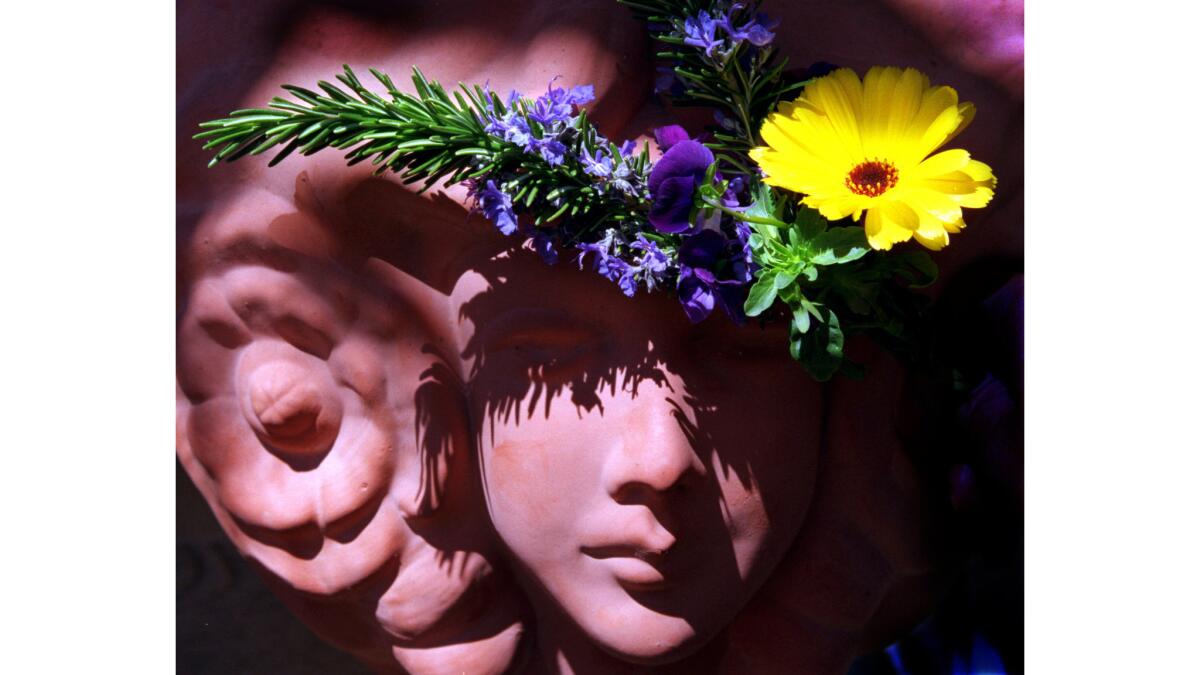Growing herbs, for a healthy body, mind and spirit

A combination of herbs including Tuscan blue rosemary, viola, and calendula, at Roger’s Gardens, Newport Beach.
- Share via
Herbs are fun and easy to grow, and not only can gardening keep you happy, but the herbs can help keep you healthy too.
When you think about growing herbs, you might imagine a basil Caprese salad or rosemary sprinkled on roasted potatoes. But did you know that the scent of crushed rosemary may improve memory? That basil can reduce swelling from a sprain?
“There’s no question herbs can help people ease mild ailments and avoid [over-the-counter] drugs and even some prescription medicines,” says Boston-based naturopath Cathy Wong. Nipping a mild ailment in the bud might even help keep it from becoming more serious. Wong also likes the fact that garden herbs can be made into teas. “People struggle to drink enough water every day. Herbal teas make it easy.”
Studies show that gardening improves your body. All that digging, raking and bending up and down strengthens your arms, back and abdominal muscles. Gardening also has been shown to reduce stress more than other leisure interests, including reading, and it’s ranked one of the top outdoor activities for adults. Exercising in nature is uplifting; ecotherapists believe that even if it’s just in your backyard, it’s vital to touch the earth regularly.
There’s great satisfaction in cultivating a plant that you can use. Growing your own produce also gets kids more involved in the food they eat. Americans are catching on; according to the National Gardening Assn., nearly 35% of U.S. households grow food at home or in a community garden. We’re betting that you’ll fall in love with the power and the flavor of these amazing herbs and will start throwing them into whatever dishes you can.
Garden herbs can be grown from seeds; a few (like rosemary) grow slowly, so starting with a cutting or root division is better. Most nurseries stock or can order them for you; search online for seed catalogs. And the herbs can be started (or even stay) in a sunny windowsill, then planted in well-drained soil and full sunlight. Some garden herbs are biannual; some are perennial, which means they will come back for at least three years before needing replacement. Leaves should be picked before the plants flower. If you live in a cold climate, mulch in the fall.
You can start as small as you like and get bigger. Herbalist Nancy Smithers started her company, Nova Scotia Organics, in her home garden when her sister, who was training in India to be a healer, was not satisfied with the quality of the herbs she found at grocers. “I loved gardening, and my sister got a master herbalist to teach me to identify and grow these healing herbs. That was 23 years ago.”
Smithers suggests growing the herbs shown here, and lavender, garlic, onion and parsley.
“Pick lavender flowers in full bloom and put them in a mesh bag for a non-toxic moth repellent,” Smithers said. “Don’t plant in rows; instead, design clumps of flowers and colors. And throw in colorful nasturtiums — the vines will intertwine with the other flowers, and you can use them in salads for a peppery taste. When the seeds come out, put them in vinegar; they taste just like capers.” And if you don’t want to use chemical fertilizers, Smithers suggests putting fresh seaweed on the ground around plants, letting it decompose a bit, then mixing with the soil.
If using any herbs for purposes other than culinary preparations, consult a doctor if you are pregnant, nursing or taking blood thinners. And don’t give them to children under 2.
Let your healthcare provider know about any herbs you are taking, says Dr. Melissa Young of the Center for Integrative Medicine at Cleveland Clinic Wellness Institute. “Herbs for mild ailments, like mint for indigestion, are quite safe for short-term use, but long-term herbal therapy should be used under the guidance of a physician with training and experience in this area.”


